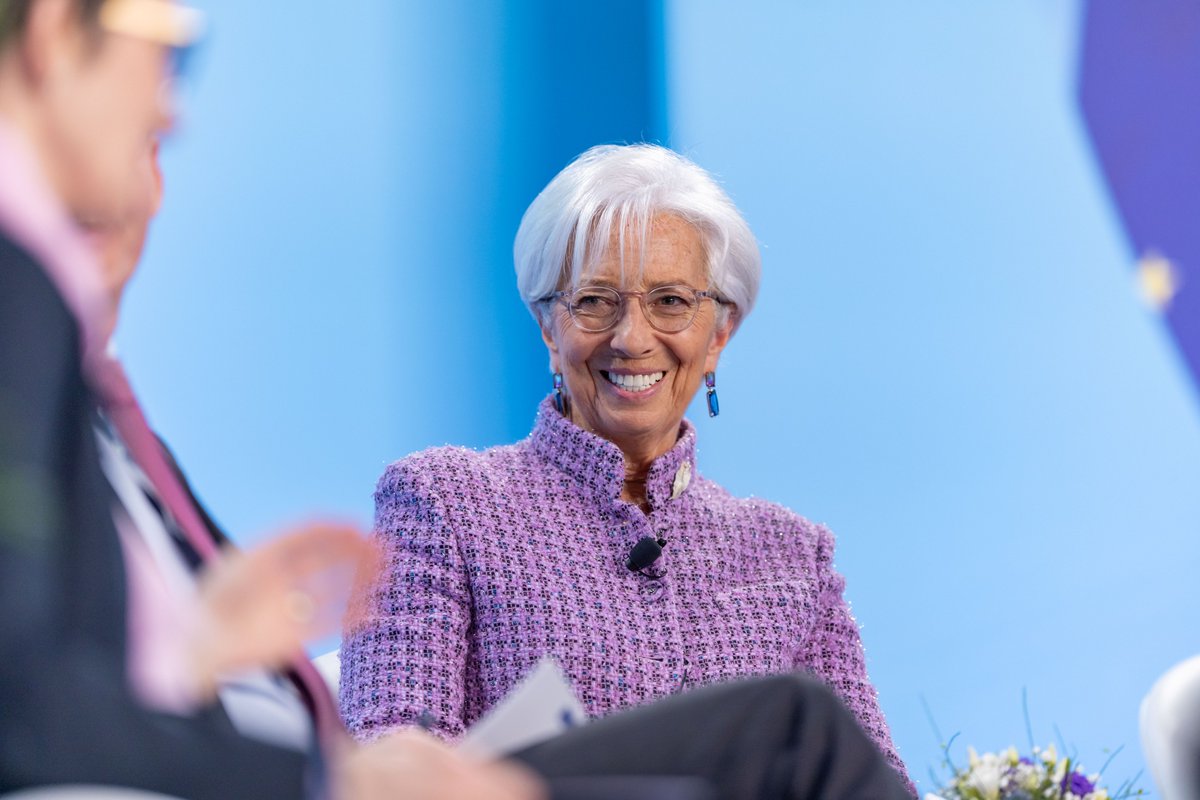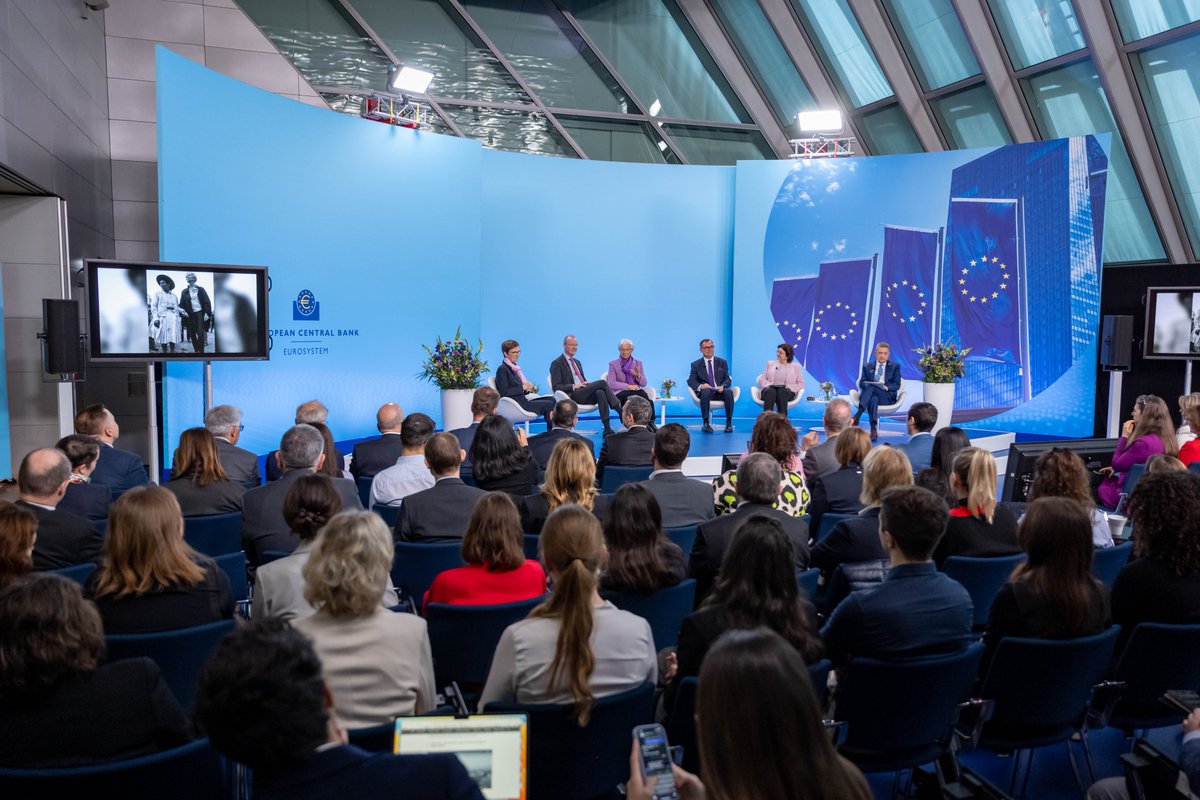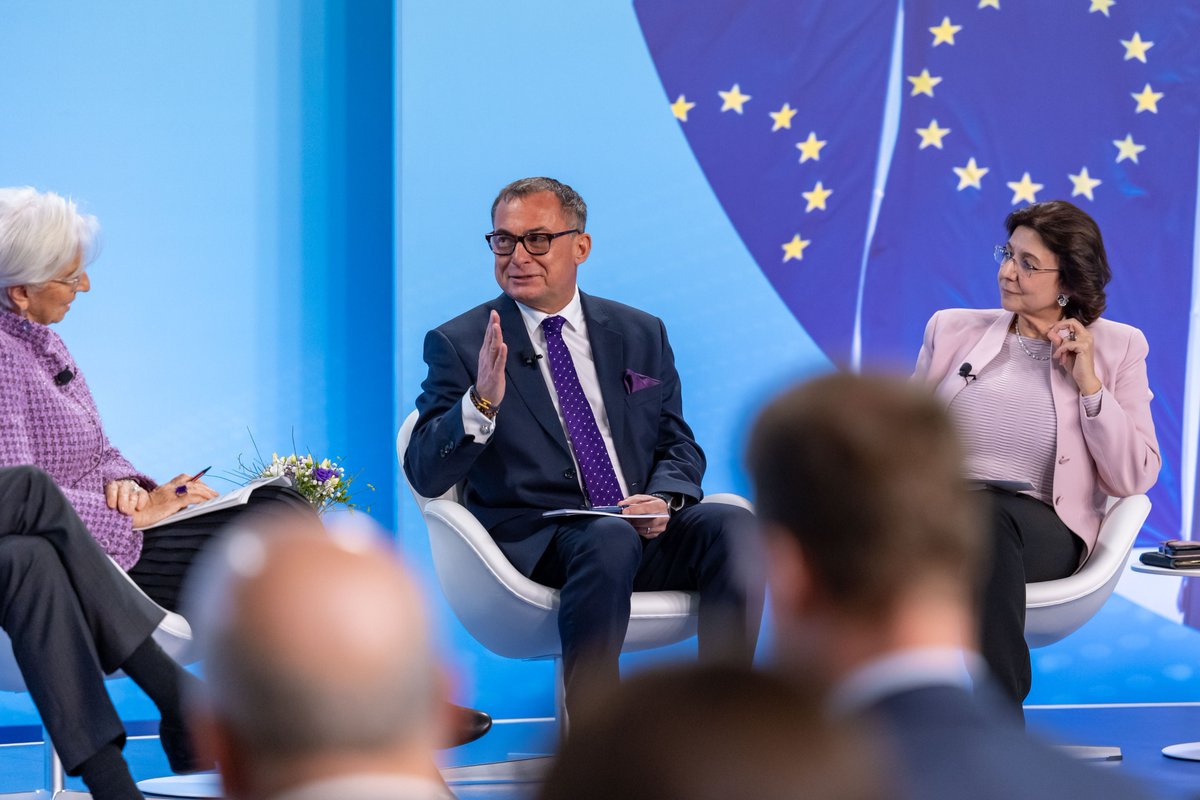IWD 2025 saw European Central Bank host a powerful conversation on closing the gender gap in financial literacy
Financial literacy is crucial for successfully navigating the complexities of today’s financial landscape. Yet, various studies have revealed a stark gender gap, with women displaying lower levels of financial knowledge compared to men.
At an important event on 7 March 2025 supporting International Women's Day, President of the European Central Bank (ECB) Christine Lagarde and five panellists discussed the importance of financial literacy for central banks and banking supervision authorities and its impact on monetary policy transmission. Panellists focused on closing the gender gap and the potential for collaboration.
"60% of Europeans with low financial literacy are women. This gender gap is a systemic issue that affects the entire European economic fabric, including our monetary policy and financial stability. We need to Accelerate Action and take swift steps towards gender equality," said President Lagarde.

The Closing the Gender Gap in Financial Literacy event aligned with the International Women's Day (IWD) call to Accelerate Action for gender equality.
"This year’s International Women’s Day theme is Accelerate Action, focusing on strategies designed to promote women’s advancement," said the ECB.
President Lagarde must certainly be applauded for her continued advocacy for gender equality. President Lagarde, an impressive trailblazer herself, has been described as 'a beacon of courage and resilience in the world of global finance and politics' and has reportedly been quoted as saying: "It’s not enough to just talk about equality; we must take action to close the gender gap in all areas."
Watch Closing the Gender Gap in Financial Literacy event
The gender gap in financial literacy is pervasive, including among the young, the well-educated, and the high-income groups. Watch the conversation.
Strong commitment to action

From the event, the panellists and the participating Governors agreed to deliver on the following five commitments:
- Be a voice for change and keep raising awareness in the respective countries, institutions and communities.
- Create a central bank financial literacy network focusing on promoting financial literacy, addressing the gender gap and sharing best practices and resources for collective action.
- Include national competent authorities in the network, leveraging their consumer protection function.
- Develop a comprehensive and harmonised dataset across Europe, extend data collection to countries that lack these data and create standardised measures for financial literacy.
- Enhance financial literacy efforts in three key teachable moments of a person’s life: (i) early education, (ii) taking out a major loan (e.g. buying a house or starting a business), and (iii) building a pension.
Impressive panellists offering insightful input

President Lagarde was joined at the event by five key colleagues.
Read more about President Lagarde's impressive profile and that of her fellow panellists.
Christine Lagarde has been President of the ECB and, in this function, also Chair of the European Systemic Risk Board since November 2019. Between 2011 and 2019 she served as Managing Director of the International Monetary Fund. Prior to that she served as French Minister of Economy and Finance from 2007 to 2011, having been Trade Secretary from 2005 to 2007. A lawyer by background, she practised for 20 years with international law firm Baker McKenzie, of which she became Global Chair in 1999. She was the first woman to hold each of these positions. In 2022 Christine was ranked the second most influential woman in the world by Forbes. She has also been recognised by TIME as one of the 100 most influential people in the world. She was named Officer in the French Order of the Legion of Honor in April 2012 and Commander in the National Order of Merit in May 2021.
Further awards and positions include:
- Number two on Forbes’ list of The World’s 100 Most Powerful Women (2020)
- Number two on Forbes’ list of The World’s 100 Most Powerful Women (2019)
- Member of the International Gender Champions network and Co-Chair of its Finance Hub (2019)
- Participation on the G7 Gender Equality Advisory Council (2018)
- Global Women’s Leadership Award from the International (2017)
- Planning Committee of the Global Summit of Women (2016)
- Participation on the UN Secretary-General’s High-Level Panel on Women’s Economic (2016)
- Mohammed Bin Rashid Medal of Honor for Women (2016)
- Woman of the Year and Lifetime Achievement Award from Glamour Magazine (2016)
Claudia Buch is Chair of the Supervisory Board of the ECB, and also a member of the Group of Central Bank Governors and Heads of Supervision of the Bank for International Settlements. Claudia Buch was Vice President of the Deutsche Bundesbank from May 2014 to December 2023, and before she was President of the Halle Institute for Economic Research, Professor of Economics at the Universities of Magdeburg and Tübingen, and member of the German Council of Economic Experts. She worked for the Kiel Institute for the World Economy, was awarded a doctoral degree and a habilitation (German post-doc degree) by the University of Kiel, and she studied Economics at the University of Bonn.
Klaas Knot is the President of De Nederlandsche Bank, and a member of the Governing Council and General Council of the ECB, as well as a member of the General Board of the European Systemic Risk Board, a member of the International Monetary Fund’s Board of Governors and a member of the Board of Directors of the Bank for International Settlements. Alongside these positions, Klaas holds a number of academic posts: in 2005 he became Professor of Economics of Central Banking at the University of Groningen, and in 2015 he was appointed as an honorary professor of monetary stability in the Faculty of Economics and Business at the University of Amsterdam. He has also published various articles on monetary and financial economics in leading Dutch and international journals. Klaas is also a member of the Group of Thirty, a global body of economic and financial leaders from the public and private sectors and academia. Before taking on the presidency of De Nederlandsche Bank, Klaas was Deputy Treasurer-General and Director of Financial Markets at the Dutch Ministry of Finance (2009-11). Prior to that he had worked at the central bank for almost 12 years in several positions, including Senior Economist in the Monetary and Economic Policy Department and Director of the Supervisory Policy Division. He was also previously employed by the former Pensions and Insurance Supervisory Board of the Netherlands (2003-04) and the International Monetary Fund (1998-99). Klaas graduated with honours in economics from the University of Groningen in 1991 and went on to obtain a PhD in economics in 1995.
Annamaria Lusardi is the Director of the Stanford Initiative for Financial Decision-Making, a partnership between the Graduate School of Business (GSB), the Stanford Institute for Economic Policy Research (SIEPR), and the Economics Department. She is a Professor of Finance (by courtesy) at GSB and a Senior Fellow at SIEPR. Previously, she was University Professor at the George Washington University and the Joel Z. and Susan Hyatt Professor of Economics at Dartmouth College. Lusardi is the founder and inaugural editor of the Journal of Financial Literacy and Wellbeing. She has advised the U.S. Treasury and led Italy’s Financial Education Committee, which is in charge of designing a national strategy for financial literacy. She holds a Ph.D. in Economics from Princeton University and an honorary doctorate from the University of Vaasa in Finland.
Joachim Nagel has been President of the Deutsche Bundesbank since January 2022. Prior to this, he had already served in management positions at the Bundesbank between 1999 and 2016, including as an Executive Board member from 2010 with responsibility for the Directorates General Markets, Controlling and IT. From 2016 to 2020, he worked for the KfW Group, including as an Executive Board member. In 2020, he moved to the Bank for International Settlements (BIS) where he became Deputy Head of the Banking Department. Dr Nagel studied economics at the University of Karlsruhe and received a doctoral degree in 1997. He also serves as a member of the Governing Council of the ECB, a Governor at the IMF and a member of the BIS Board of Directors.
Fabio Panetta is the Governor of Banca d’Italia and Chairman of the joint Governing Board of the Italian Insurance Supervisory Authority since 1st November 2023, he is a member of the ECB Governing and General Councils, the ESRB General Board, the BIS Board of Directors, the FSB Plenary and Steering Committee, and the World Bank and IMF Boards of Governors. He is also Chair of the BIS Committee on Payments and Market Infrastructures and the FSB Cross Border Payments Coordination Group. From 2020 to 2023 he was a member of the ECB Executive Board and Chair of the European Retail Payments Board and the Euro Cyber Resilience Board for pan-European Financial Infrastructures. He holds a B.A. in Economics from LUISS University (Rome), an M.Sc. in Economics from the London School of Economics and a Ph.D. in Economics and Finance from the London Business School and is the author of numerous books and papers published in the most noted international journals.

Forging positive outcomes for women
With important groups like the European Central Bank sharing critical conversations and forging positive action, there is great hope that many bodies and groups will indeed work collectively to accelerate action in closing the gender gap for financial literacy.
The economic advancement of women remains a crucial factor in promoting gender equality, driving economic growth, and fostering more inclusive and sustainable societies, ultimately benefiting everyone.